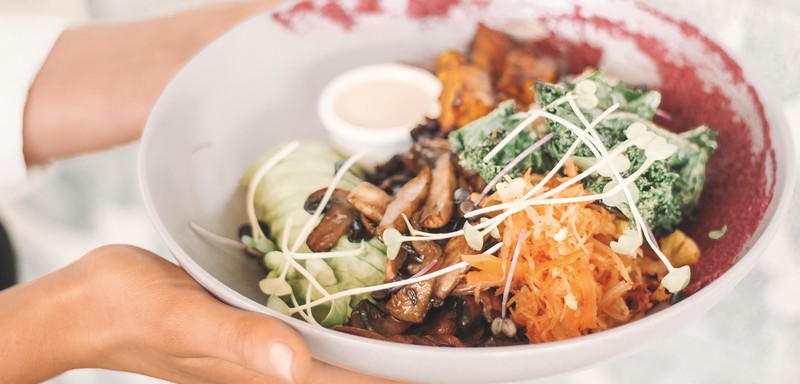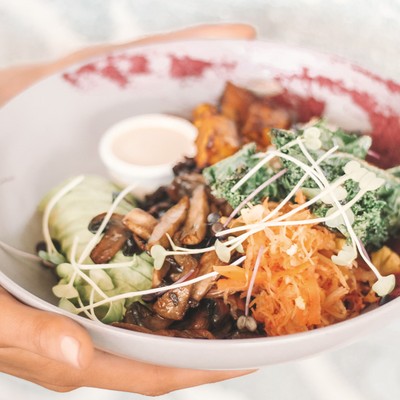

The Nutritionists’ Guide To Eating For The Menopause
Start By Eating More Protein
“Protein is critical for stabilising blood sugar and building muscle mass, 40% of which we can lose during menopause. We also need the amino acids found in protein to build the neurotransmitters needed for mood, concentration and motivation. Aim for at least 1.8g per kg of bodyweight and more if you exercise regularly. Protein from lean meat, fish and eggs is what’s known as complete protein. Other forms of protein that are plant based (grains, pulses, nuts, seeds) are incomplete and can lack all of the amino acids. It is therefore important to eat a wide variety of plant proteins if you are vegetarian or vegan.” – Emma Bardwell, registered nutritionist
Prioritise Gut Health
“The gut microbiome changes as you age, and this in turn can affect metabolism and increase insulin resistance. The gut is responsible for the production of serotonin (our happy hormone) as well as other hormones, so it’s vital to keep it in balance during the menopausal years. A decrease in stomach acid can also cause indigestion, acid reflux and affect nutrient absorption. Prebiotics act as food for your beneficial bacteria – good sources include asparagus, leeks, garlic and oats. Probiotics, meanwhile, replenish levels of good bacteria – look to miso, sauerkraut, kombucha and kimchi.” – Lucy Miller, nutritional therapist
Up Your Calcium
“Calcium requirements double after the menopause. Under the age of 50, women need around 700mg a day of calcium and, post-50, this jumps to 1200mg per day. Look to dairy or fortified plant milk, both of which have an identical calcium content so long as you shake the carton before consuming, as the added calcium tends to sink to the bottom. Other good sources of calcium include tinned fish with bones, like sardines and whitebait, tofu, broccoli, white beans, dried figs, almonds, oranges, kale and watercress.” – Emma
Be Careful With Gluten
“Gluten is the Latin word for glue, and it has been shown to increase intestinal permeability, or a ‘leaky gut’. You don’t need to be coeliac for gluten to cause problems – there is much research on what is now known as non-coeliac gluten sensitivity. Gluten just isn’t very helpful post-menopause, and many of us eat far too much – toast or Weetabix for breakfast, followed by a sandwich for lunch and then pasta for dinner. Try to opt for gluten-free where possible (gluten-free pasta has come a long way in recent years) and buy the very best gluten options you can – whether it’s the freshest loaf of bread or quality cake and eat it mindfully.” – Karen Newby, nutritionist
Cut Back On Alcohol
“Alcohol provides no nutritional value during the menopausal years. It is liquid sugar, which causes blood sugar dips, and has a significant effect on restorative sleep. Plus, hangovers equal more refined carbs and caffeine the following day and it can also cause gut inflammation as it uses up our zinc stores. If you aren’t prepared to give up alcohol entirely, focus on excellent quality and drink less of it. This is the same premise I take to eating meat, coffee and chocolate.” – Karen
Eat Your Greens
“Green leafy vegetables are so important for mood, brain and detoxification. They’re full of calcium, which we need for healthy bones, as well as magnesium, which helps with the absorption of calcium. Magnesium also helps reduce anxiety and improve energy levels. Leafy vegetables – such as rocket, spinach, kale and watercress – are also a good source of iron, and cruciferous vegetables (like broccoli, cauliflower and cabbage) help with oestrogen detoxification. Eat them every day.” – Lucy
Don’t Cut Back On Calories
“I often see women reducing calorie intake to extreme levels at this stage in life. However, we need to remember that calories provide our body with the nutrients to maintain good mood and cognition as well as hair, skin, nails and hormone production. Long fasts, extreme calorie deprivation and excluding food groups can be detrimental to women’s health, especially at this stage in life.” – Emma
Stock Up On Vitamin D
“Many brands are jumping on the menopause bandwagon, offering products that promise better skin, stronger hair and weight loss. Don’t be lured by these products. However, the one supplement we all need is vitamin D. It’s particularly important for bone health, something post-menopausal women really need to be conscious of as brittle bones can affect as many as one in two women post-50. Look for a D3 form, ideally coupled with K2, as this can help the absorption of calcium into the bone where it’s needed.” – Emma
Try A Coffee Alternative
“Green tea and matcha are fantastic, nutrient-rich alternatives to coffee. They help to circulate testosterone, oestrogen and insulin, and can also increase dopamine levels and have a therapeutic effect on the brain. Organic sage tea and hibiscus tea are also helpful for hot flushes, while Teapigs’ Calm and Sleep teas encourage relaxation and sleep. Try using two teabags in one cup for a stronger effect.” – Lucy
Have A Savoury Breakfast
“After menopause, changes in hormone levels can trigger fluctuations in blood sugar. Stabilising blood sugar is important to prevent health issues, maintain energy and improve mood. Starting the day with a savoury breakfast is a great place to start. If you like oats and berries, be sure to add plenty of protein and fibre in the form of nuts and seeds to prevent sugar spikes. When it comes to lunch, try to add in as many nutrient-dense ingredients as possible. Try creating your own version of a Buddha bowl – think complex carbs and fibre in the form of brown rice, beans and lentils; a source of protein like salmon, chicken or boiled eggs; good fats like avocado; and a source of pre or probiotic food like garlic, asparagus and chicory, or Vadasz sauerkraut.” – Lucy
Experiment With Supplements
“For a variety of reasons, including age, lifestyle, intestinal health and the effect of decreasing oestrogen levels on the body, nutrient gaps can appear throughout the menopause transition. It is always best to try to get these nutrients from a balanced diet, but I’d always recommend taking a high quality multi vitamin specific to the post-menopausal years to ensure any shortfalls are met. Cytoplan 50+ Multivitamin is my go-to as it contains highly absorbable forms of all the vitamins needed in the post-menopausal years. Bare Biology’s Rise and Shine contains omega-3 and vitamin D – it’s a powerful anti-inflammatory – and Biokult’s Advanced Multi-Strain Probiotic can help support gut health. If you are concerned with osteoporosis, try Cytoplan Bone Support, and if you are really struggling with menopausal symptoms, M Powder’s MenoBoost comes highly recommended.” – Lucy
Incorporate Magnesium Into Your Evening
“Research shows women get five weeks’ less sleep than men during the menopause. Magnesium can aid a better night’s sleep. Take an Epsom salt bath in the evening (make sure you soak for at least 20 minutes) and increase your intake of magnesium-rich foods for supper – think green leafy vegetables, black beans, avocado and pumpkin seeds.” – Karen
For more information visit LucyMillerNutrition.com, EmmaBardwell.com and KarenNewby.com. Karen’s new book, The Natural Menopause Method, is available now to pre-order.
DISCLAIMER: Features published by SheerLuxe are not intended to treat, diagnose, cure or prevent any disease. Always seek the advice of your GP or another qualified healthcare provider for any questions you have regarding a medical condition, and before undertaking any diet, exercise or other health-related programme.
DISCLAIMER: We endeavour to always credit the correct original source of every image we use. If you think a credit may be incorrect, please contact us at info@sheerluxe.com.

